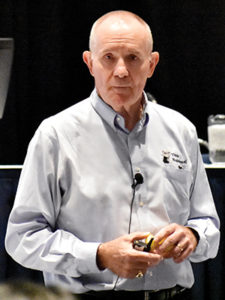
While there is a lot of uncertainty in today’s health care environment when it comes to evolving payment structures and changing practice models, one thing seems to be relatively certain — value-based care is coming and is here to stay, according to medical practice management consultant Owen Dahl, FACHE, CHBC, LSSMBB, president of Dahl Consulting Group in Houston, TX.
Dahl delivered the keynote address “The Moving Targets: Practice Models and Alignment Strategies” during Saturday’s daylong Pre-Meeting Workshop ACR Practice Management: Putting the Pieces Together — Winning Strategies for Rheumatology Practices.
“We are operating in a world of uncertainty today — no one can really tell us where we will be one year, three years, or five years from now,” Dahl said. “With that in mind, physicians, particularly those in private practice, need to take off their diagnostic hats and put on their business hats to think about adaptive strategies today that will better prepare them for tomorrow.”
Providers in a value-based care system are paid based on outcomes, so there are rewards for improved health, improved control of chronic conditions, and improved quality of life, all based upon evidence. Success, Dahl said, requires a value-based care organization to identify a target population and assess their risk, attribute a provider to the patient(s), develop a care plan, engage the patient and manage their status, alert the care team of status changes, and finally, measure outcomes.
“One of the major goals of value-based care is that it will ultimately lead to healthier communities, an outcome that we all hope to see,” Dahl said. “That starts at the individual patient level, and developing and sharing the care plan is crucial. Getting your patient to actually comply with the treatment plan is something you can’t do alone — you have to do it with fellow members of your team.”
Among the touted benefits of the value-based care model include less money spent to achieve better health, greater provider efficiency, greater patient satisfaction, and eventually, a healthier community. Ultimately, Dahl noted, it’s about transitioning away from “sick care” and moving toward “wellness care.”
“Patient engagement is critical, but it’s a challenge when you’ve got to see so many patients over the course of a day, and you end up with only that five-to-10 minute visit with a given patient,” Dahl said. “One of the data points we’ve seen is that roughly 75 percent of the time a patient is in the office, they are spending it with people other than clinicians. So, as you think through your practice, as you think through your model, it’s important to understand that effective patient engagement strategies can really pay off.”
Dahl said the concept of an integrated delivery system (IDS) and accountable care organization (ACOs) receives significant attention as value-based care continues to take hold. An IDS, he said, can be a financial or contractual arrangement between health care providers — usually hospitals and physicians — to offer a comprehensive range of health services through a separate legal entity operating, at least for these purposes, as a single health care delivery system.
The primary goal of ACOs, he added, is to enable and encourage health care providers to take greater responsibility for reducing, or at least controlling, health care costs for a given population of patients while maintaining or improving quality of care.
Moving forward, Dahl encourages practitioners to engage in different scenario-planning strategies with their colleagues and staff in order to be best prepared and able to adapt to whatever value-based care model they ultimately use.
“Linear thinking, going from today to tomorrow, is not necessarily the right way to think in this time of uncertainty,” he said. “Now is the time to be proactive, rather than reactive to both the opportunities and the challenges that will be coming.”


